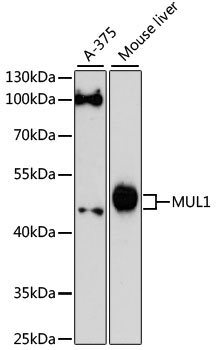Product Name :
MUL1 polyclonal antibody Background :
Exhibits weak E3 ubiquitin-protein ligase activity. E3 ubiquitin ligases accept ubiquitin from an E2 ubiquitin-conjugating enzyme in the form of a thioester and then directly transfer the ubiquitin to targeted substrates. Can ubiquitinate AKT1 preferentially at 'Lys-284' involving 'Lys-48'-linked polyubiquitination and seems to be involved in regulation of Akt signaling by targeting phosphorylated Akt to proteosomal degradation. Mediates polyubiquitination of cytoplasmic TP53 at 'Lys-24' which targets TP53 for proteasomal degradation, thus reducing TP53 levels in the cytoplasm and mitochondrion. Proposed to preferentially act as a SUMO E3 ligase at physiological concentrations. Plays a role in the control of mitochondrial morphology by promoting mitochondrial fragmentation, and influences mitochondrial localization. Likely to promote mitochondrial fission through negatively regulating the mitochondrial fusion proteins MFN1 and MFN2, acting in a pathway that is parallel to the PRKN/PINK1 regulatory pathway. May also be involved in the sumoylation of the membrane fission protein DNM1L. Inhibits cell growth. When overexpressed, activates JNK through MAP3K7/TAK1 and induces caspase-dependent apoptosis. Involved in the modulation of innate immune defense against viruses by inhibiting DDX58-dependent antiviral response. Can mediate DDX58 sumoylation and disrupt its polyubiquitination. Product :
1mg/ml in PBS with 0.02% sodium azide, 50% glycerol, pH7.2 Storage&Stability :
Store at 4°C short term. Aliquot and store at -20°C long term. Avoid freeze-thaw cycles. Specificity :
Unmodification Immunogen :
Recombinant fusion protein of human MUL1(NP_078820.2). Conjugate :
Unconjugated Modification :
Unmodification
MUL1 polyclonal antibody Background :
Exhibits weak E3 ubiquitin-protein ligase activity. E3 ubiquitin ligases accept ubiquitin from an E2 ubiquitin-conjugating enzyme in the form of a thioester and then directly transfer the ubiquitin to targeted substrates. Can ubiquitinate AKT1 preferentially at 'Lys-284' involving 'Lys-48'-linked polyubiquitination and seems to be involved in regulation of Akt signaling by targeting phosphorylated Akt to proteosomal degradation. Mediates polyubiquitination of cytoplasmic TP53 at 'Lys-24' which targets TP53 for proteasomal degradation, thus reducing TP53 levels in the cytoplasm and mitochondrion. Proposed to preferentially act as a SUMO E3 ligase at physiological concentrations. Plays a role in the control of mitochondrial morphology by promoting mitochondrial fragmentation, and influences mitochondrial localization. Likely to promote mitochondrial fission through negatively regulating the mitochondrial fusion proteins MFN1 and MFN2, acting in a pathway that is parallel to the PRKN/PINK1 regulatory pathway. May also be involved in the sumoylation of the membrane fission protein DNM1L. Inhibits cell growth. When overexpressed, activates JNK through MAP3K7/TAK1 and induces caspase-dependent apoptosis. Involved in the modulation of innate immune defense against viruses by inhibiting DDX58-dependent antiviral response. Can mediate DDX58 sumoylation and disrupt its polyubiquitination. Product :
1mg/ml in PBS with 0.02% sodium azide, 50% glycerol, pH7.2 Storage&Stability :
Store at 4°C short term. Aliquot and store at -20°C long term. Avoid freeze-thaw cycles. Specificity :
Unmodification Immunogen :
Recombinant fusion protein of human MUL1(NP_078820.2). Conjugate :
Unconjugated Modification :
Unmodification
-
 Western blot analysis of extracts of various cell lines, using MUL1 antibody at 1:3000 dilution.
Western blot analysis of extracts of various cell lines, using MUL1 antibody at 1:3000 dilution.
Secondary antibody: HRP Goat Anti-Rabbit IgG at 1:10000 dilution.
Lysates/proteins: 25ug per lane.
Blocking buffer: 3% nonfat dry milk in TBST.
Detection: ECL Enhanced Kit .
Exposure time: 90s.
Bioworld Biotech only provide peptides for our antibodies and do not provide additional peptide customization services.
Price/Size :
USD 368/1mg/vial
Tips:
For phospho antibody, we provide phospho peptide(0.5mg) and non-phospho peptide(0.5mg).Describe :
Blocking peptides are peptides that bind specifically to the target antibody and block antibody binding. These peptide usually contains the epitope recognized by the antibody. Antibodies bound to the blocking peptide no longer bind to the epitope on the target protein. This mechanism is useful when non-specific binding is an issue, for example, in Western blotting (WB) and Immunohistochemistry (IHC). By comparing the staining from the blocked antibody versus the antibody alone, one can see which staining is specific; Specific binding will be absent from the western blot or IHC performed with the neutralized antibody.Formula:
Synthetic peptide was lyophilized with 100% acetonitrile and is supplied as a powder. Reconstitute with 0.1 ml DI water for a final concentration of 10 mg/ml.The purity is >90%,tested by HPLC and MS.
Storage:
The freeze-dried powder is more stable. For short time at 2-8°C. For long term storage store at -20°C.
Note :
This product is for research use only (RUO only). Not for use in diagnostic or therapeutic procedures.
 MUL1 polyclonal antibody
MUL1 polyclonal antibody  Datasheet
Datasheet COA
COA MSDS
MSDS SHIP
SHIP